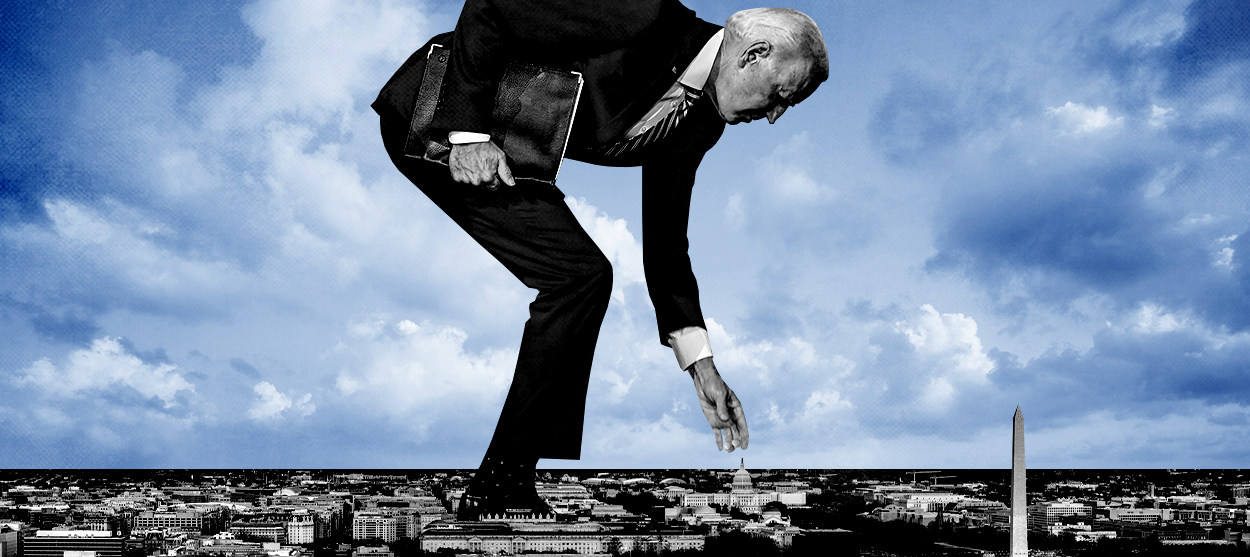Biden makes big government feel inevitable
The opposition just can't muster the fight


Americans are troubled by our soaring national debt and deficit. A Gallup poll in early March found 49 percent worry a "great deal" about debt-funded federal spending, and another 28 percent worry a "fair amount." Fewer than one in 10 said they don't worry at all. My colleague Ryan Cooper believes "How are you going to pay for that?" is the "dumbest question in politics," but it is nevertheless a question Americans persistently ask.
When that Gallup survey was conducted, the national debt was around $28 trillion, higher than our GDP for the first time since World War 2. That month, President Biden signed the $1.9 trillion American Rescue Plan (which spent a lot of money on things unrelated to the COVID-19 pandemic). In a Wednesday evening speech to Congress, the president proposed another $4.1 trillion in spending: $2.3 trillion for the infrastructure- and employment-focused American Jobs Plan (which includes huge corporate handouts) and $1.8 trillion for the education- and childcare-centric American Families Plan (which doesn't give the low-income families the childcare they actually want).
This is so much money and a massive expansion of the federal government. And yet it feels ... inevitable?
Subscribe to The Week
Escape your echo chamber. Get the facts behind the news, plus analysis from multiple perspectives.

Sign up for The Week's Free Newsletters
From our morning news briefing to a weekly Good News Newsletter, get the best of The Week delivered directly to your inbox.
From our morning news briefing to a weekly Good News Newsletter, get the best of The Week delivered directly to your inbox.
Maybe not wholly so, but I'd be sincerely surprised if large portions of Biden's Wednesday proposals fail to pass. Yes, most congressional Republicans will vote (and fundraise) against them, but Biden has probably hit on a winning combination here: headline items that are politically difficult to oppose, a public recently conditioned to accept unprecedented federal spending, and the last gasp of significant opposition to big, debt-funded government in Washington.
The political advantages of Biden's plan are evident. For one thing, it's arguably more expansion of the scale of federal government than its scope. Washington is already involved in infrastructure, employment, education, and childcare. In that sense, this isn't new territory, so a principled case against Biden's proposals is disadvantaged from the start, pitted against the status quo as well as the new ideas.
Biden has also toplined his agenda with very attractive stuff. Who doesn't want good roads? Safe bridges? Clean drinking water? These fill obvious needs and are broadly accepted in the U.S. as a legitimate government function. Likewise, who's against job creation after a year of pandemic-induced recession? Or affordable childcare for kids under 5? I don't think Biden's plan is the best way to handle this need, but it is a very real need.
There are lots of other, less sympathetic things in these legislation packages — like those corporate subsidies — and they'll unquestionably have other, less positive effects than those Biden envisioned in his speech. But those effects will be difficult to notice. We can count new jobs and daycare spots. We can look at a new bridge or highway. We can't see all the lost opportunities, now become mere counterfactuals, which Biden's plan precluded. We struggle to understand long-term, diffuse costs like inflation, which devalues the money in our pockets. We dismiss (in practice, if not in conversations with pollsters) fiscal hawks' perpetual warnings of coming catastrophic consequences for our national profligacy. Biden won't be trumpeting the jobs his tax hikes kill, only those his spending hikes birth.
Economic journalist Henry Hazlitt famously argued that the "art of economics consists in looking not merely at the immediate but at the longer effects of any act or policy; it consists in tracing the consequences of that policy not merely for one group but for all groups." Unfortunately, this is exactly what most of us near-innumerates (I include myself in the category) rarely manage to do.
Biden's second happy circumstance is the fact that Americans have spent four years becoming acclimatized to colossal federal spending. Even before the COVID-19 pandemic began, the last administration was not fiscally conservative. Trump presided over more deficit spending in his first three years ($2.4 trillion) than former President George W. Bush did in eight ($2 trillion). Had he won a second term, Trump could have topped the deficit spending of the Obama administration, too. Then the pandemic hit, and $1+ trillion packages became a new norm. This year, the Congressional Budget Office projects a budget deficit of $2.3 trillion, and a public which ostensibly worries about the national debt simply shrugs. Biden's timing is fortuitous. He's not letting this crisis go to waste.
Trump's rejection of constraints on federal spending and authority also paved the way for Biden in an ideological sense. The pre-Trump GOP constantly betrayed its limited-government principles; the post-Trump GOP hasn't got any.
Republicans might pantomime fiscal conservatism if their fundraising staff believe it will play well in this month's direct mail, yet if Trump had proposed the American Rescue, Jobs, and Families Plans, we all know most of the congressional GOP would have loyally lined up to vote "yes." There are exceptions, sure, but just as there is no faction in Washington which combines real power with a durable, principled antiwar stance, so there is no faction with real power and a nonpartisan commitment to small government.
It's lucky for Biden and unlucky for the rest of us, but hardly anyone really cares.
A free daily email with the biggest news stories of the day – and the best features from TheWeek.com
Bonnie Kristian was a deputy editor and acting editor-in-chief of TheWeek.com. She is a columnist at Christianity Today and author of Untrustworthy: The Knowledge Crisis Breaking Our Brains, Polluting Our Politics, and Corrupting Christian Community (forthcoming 2022) and A Flexible Faith: Rethinking What It Means to Follow Jesus Today (2018). Her writing has also appeared at Time Magazine, CNN, USA Today, Newsweek, the Los Angeles Times, and The American Conservative, among other outlets.
-
 The last words and final moments of 40 presidents
The last words and final moments of 40 presidentsThe Explainer Some are eloquent quotes worthy of the holders of the highest office in the nation, and others... aren't
-
 The JFK files: the truth at last?
The JFK files: the truth at last?In The Spotlight More than 64,000 previously classified documents relating the 1963 assassination of John F. Kennedy have been released by the Trump administration
-
 'Seriously, not literally': how should the world take Donald Trump?
'Seriously, not literally': how should the world take Donald Trump?Today's big question White House rhetoric and reality look likely to become increasingly blurred
-
 Will Trump's 'madman' strategy pay off?
Will Trump's 'madman' strategy pay off?Today's Big Question Incoming US president likes to seem unpredictable but, this time round, world leaders could be wise to his playbook
-
 Democrats vs. Republicans: which party are the billionaires backing?
Democrats vs. Republicans: which party are the billionaires backing?The Explainer Younger tech titans join 'boys' club throwing money and support' behind President Trump, while older plutocrats quietly rebuke new administration
-
 US election: where things stand with one week to go
US election: where things stand with one week to goThe Explainer Harris' lead in the polls has been narrowing in Trump's favour, but her campaign remains 'cautiously optimistic'
-
 Is Trump okay?
Is Trump okay?Today's Big Question Former president's mental fitness and alleged cognitive decline firmly back in the spotlight after 'bizarre' town hall event
-
 The life and times of Kamala Harris
The life and times of Kamala HarrisThe Explainer The vice-president is narrowly leading the race to become the next US president. How did she get to where she is now?



